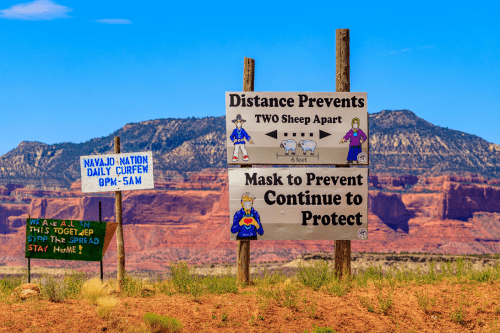
COVID-19 Pfizer Vaccine Clinical Trial
SARS-CoV-2 emerged in late 2019 and caused the global COVID-19 pandemic. Native American communities experienced among the highest rates of COVID-19 disease and death in the U.S.
This study aimed to evaluate whether an investigational vaccine candidate, created by Pfizer/BioNTech, was effective in preventing COVID-19 disease. Globally, more than 44,000 people at over 150 sites around the world volunteered for this study, including 463 Native American people. The Johns Hopkins Center for Indigenous Health (JHCIH) joined the study in September and 277 people volunteered to participate at locations in the Navajo Nation and White Mountain Apache tribal lands. Study participants were followed for up to two years after enrollment.
In December 2020, the FDA issued an emergency use authorization (EUA) for this vaccine based on safety and efficacy findings. Side effects and vaccine efficacy were similar in Native American participants, compared to other groups.
On August 23, 2021, the FDA granted full licensure of the Pfizer COVID-19 vaccine.
About the vaccine
The Pfizer/BioNTech COVID-19 vaccine is a mRNA vaccine and does not contain live virus. mRNA is the code that tells our cells what proteins to build. This vaccine tells cells to build the outside spike protein of coronavirus so that the body reacts and produces antibodies. This prepares the body to fight the real coronavirus. mRNA vaccines are made from synthetic (laboratory made) pieces copied from the coronavirus, SARS-CoV-2, not the whole virus. The vaccines cannot cause infection. They are also much quicker and simpler to make than conventional vaccines, which means that they can be produced faster and in greater quantity than other types of vaccines.
Side effects of this vaccine are similar to other licensed vaccines and are generally mild to moderate. The most common side effects included pain where the shot was given, tiredness, muscle aches and headache, and these went away after one to two days. The only severe solicited adverse event that were reported by ≥2% of vaccine recipients in the study were fatigue at 3.8% after the first or second dose and headache at 2.0% following dose 2. Results of the primary efficacy analysis found that after two doses, that vaccine was 95% effective against COVID-19 hospitalization among adults.
The severity of this global COVID-19 crisis led to an unprecedented investment in vaccine development. While this process moved quickly, it’s important to know that no steps were skipped.
About the study
During pandemic response efforts in spring and summer of 2020, many Navajo and White Mountain Apache community members expressed interest in having the opportunity to participate in ongoing COVID-19 vaccine trials. Following consultation with healthcare providers, elders, and other community leaders, this study was submitted to the Navajo Nation Human Research Review Board (NNHRRB) and Indian Health Service Institutional Review Board (NIRB). The NNHRRB and NIRB reviewed and approved this study, as did the Johns Hopkins Institutional Review Board.
Adults 18-85 years of age, who were healthy or had stable underlying medical conditions, and who had not had a prior COVID-19 infection, were eligible to volunteer for this study. Participation was entirely voluntary. People who completed an informed consent process were evaluated for eligibility by a study physician. Eligible participants were assigned at random to receive two doses of the study vaccine or a placebo, three weeks apart. Participants had a total of approximately 6-8 visits over a two-year period. Study staff collected blood samples to test for antibodies to COVID-19. In addition, participants completed weekly diary entries to monitor for side effects and illness. No other testing of specimens, beyond what was specifically stated at the time of enrollment, was allowed. No human genetic testing has been, or will be, done.
People in the study who originally received placebo were offered the Pfizer COVID-19 vaccine through the study.
Booster Study
Before duration of protection from the primary series of the Pfizer COVID-19 vaccine was known, a booster study evaluated the safety, tolerability, and efficacy of a third (booster) dose of the Pfizer COVID-19 vaccine.
Participants who enrolled in the original Pfizer COVID-19 vaccine clinical trial were eligible to participate in this booster study. A total of 156 participants were enrolled at JHCIH sites and assigned at random to receive the booster vaccine dose or placebo.
The booster dose showed a favorable safety profile and robust immune response. In November 2021, the FDA authorized a booster dose for adults. Study participants who received placebo were offered the opportunity to receive the vaccine booster dose as part of the study.